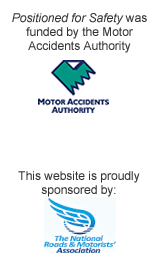How to lobby a Local Council
Local Councils are responsible for 80% of NSW roads.
You will be most effective as a lobbyist, if you understand how your Local Council operates. Who to speak to, what sort of information or community pressure works. How Councils operate will give you a general outline of the structure of Local Government. Most councils have a web site, and it will be worth your while using it to learn as much as you can about your Council.
Always speak to the relevant administrative staff first - your request may be something they can deal with as a matter of routine. If the member of staff cannot help, or if you are unhappy with their response, then it is time to lobby other areas of Council.
How to lobby
Speak directly to your local Councillor or to the Councillor who sits on the relevant committee as well as to the relevant Council administrative staff.
Make a written request for action to the Local or Regional Traffic Committee.
Make a formal request for the hazard to be referred for independent expert advice (e.g. Road Safety Auditors, Consultant Forensic Engineers etc).
Make a presentation on motorcycle safety issues to the Local or Regional Traffic Committee.
- Many Councils have a Road Safety Officer who is responsible for road safety education programs. The Road Safety Officer is a good contact who may be able to help you.
Contact local motorcycle clubs or ride groups to make a joint representation (this may carry more weight than an individuals request).
Arrange for a delegation of local motorcyclists to meet with and express their concerns to the Mayor.
Contact the Motorcycle Council (MCC) for advice. Note the MCC are developing a program of motorcycle awareness seminars for Local Council engineers and Road Safety Officers.
Contact the local media and brief them on the existence of the motorcycle hazard and what you are trying to do about it.
Some routes cross a number of Council boundaries. Establish contact and work with the relevant Local Council and RMS managers who have responsibility for the route.
Undertake a survey of specific routes to identify hazards in the design or condition of the road. Write a report in which you link each identified hazard to the relevant page in Austroads, Guide to Engineering Practice Part 15 - Motorcycle Safety.
- In some cases it may be necessary to a detailed written submission demonstrating the need for the work. A submission should present your case for action. You need to show that the problem is a safety hazard which has caused or could cause crashes. Local police, the Council and RMS will all have statistics on any reported crashes that have occurred at the site. However many motorcycle crashes are not reported, so information on the actual crash incidence at the site could be more useful. Possible sources could include a survey of local motorcyclists and motorcycle repairers.
Motorcycle Clubs
Motorcycle clubs should make contact with their Local Council to ensure they will be included in all community consultations relevant to their interests as a local road user group. These could include:
- Council commmunity education campaigns to address road user behaviour by and towards motorcyclists
- All new road designs and major Development Applications (DAs)
- The review of planning instruments (eg Local Environment Plans (LEPs) and Development Control Plans (DCPs)) to ensure that they make appropriate provision for motorcyclists (eg parking provisions in major developments).
- Social and economic planning (eg to promote the tourist value of motorcyclists to an area).
Motorcycle Council of NSW - hazard reports tracking
If you send a Hazard Report email to your council, please also send a copy of your report to the MCC. The MCC will use this information to record and track the number of hazards reported. Such records may prove useful in cases where a reported hazard has not been repaired and a crash has subsequently occurred.
MCC support for major projectsIf you believe major change is require for section or road, contact the MCC, who may be able to undertake the project or at least provide support and advice to local motorcyclists.
Larger scale projects include those that require significant costs such as those requiring the redesign of a section of road as well as those that involve routes that cross local government boundaries and/ or involve RTA roads.
For example, as a result of lobbying by the MCC, the RMS undertook a motorcycle specific road safety audit of the Old Pacific Highway between Cowan and Somersby. Further action has resulted in a number of road improvements from Berowra to Somersby

